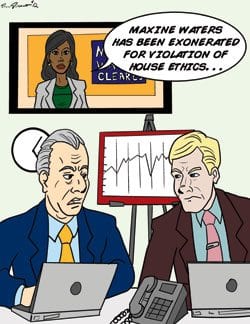
A failed witch-hunt
After more than three years in political purgatory, Maxine Waters, a member of Congress from Los Angeles, was exonerated of all House ethics violations. One must wonder in retrospect why she was charged at all.
Waters allegedly violated the rule that a member of Congress must not use one’s office for personal benefit. But it is nonsensical to claim that to arrange a meeting with a member of the government for any reason would violate that rule. Such favors are done every day as constituent services.
Waters supposedly erred by arranging a meeting between Robert Cooper, who was then president-elect of the National Bankers Association (NBA), and Henry M. Paulson, who was then Treasury Secretary. The NBA is the trade association for minority banks. The federal takeover of Fannie Mae and Freddie Mac in September 2008 had caused considerable financial damage to community banks. The NBA sought some relief.
The problem arose because Cooper was also general counsel of OneUnited Bank, in which Waters’ husband owns stock. But wouldn’t the same offence apply if he were a shareholder in any NBA bank?
At any rate, the meeting with Paulson resulted only in information and no benefits. The Troubled Asset Relief Program (TARP) of October 2008 benefitted only those banks that were “too big to fail.” It took the effort of Barney Frank, then chairman of the House Financial Services Committee, to propose an amendment that would benefit community banks. Waters did not vote on the amendment because of the possibility of a conflict of interest.
Frank’s bill passed but TARP benefits were not automatic. Banks had to get the approval of their regulating agency. OneUnited Bank did so, and after raising the FDIC-required additional capital, the bank was approved for $12 million of TARP funds. It is absurd to suggest that this was the direct result of Waters’ intervention.
Because of the criticism by the press, the inspectors general of both the FDIC and the Treasury investigated and determined there was no undue influence. Nonetheless, major media published stories to suggest that OneUnited Bank was somehow complicit with Waters in a violation of House ethics. The press relied on leaked e-mails from disgruntled FDIC employees in support of their stories. What the press had without recognizing it was evidence of bigotry in the agency.
The process to try Waters before the Ethics Committee for her violations became so corrupted that the trial scheduled for Nov. 29, 2010 was indefinitely postponed. Staff lawyers who were supposed to be impartially investigating and preparing the case for trial were fired for impropriety. Any attempt to prosecute Waters would have put the House on trial.
The final solution was for the House to hire a competent outside counsel, William Martin, who came to the inevitable conclusion after thoroughly reviewing the evidence that there was no case. Waters had to be exonerated.
It does not take rocket science to see that there was no cause and effect. Waters’ involvement did not result in benefits to anyone. Thus there was no case from the very beginning. This case points out the fragility of the status of prominent blacks and significant minority institutions in an environment that has not yet outgrown racial hostility.






